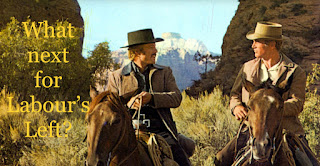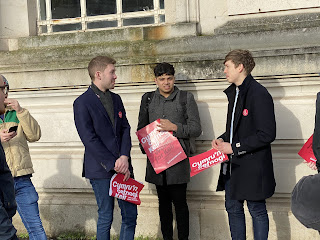If you are on “the left” it is pretty much inevitable that you will describe yourself as a ‘socialist’. Which, by extension, means that you believe that society would be better arranged if it was run on socialist lines. So far, so good. But ask most socialists what they think of as socialism and the agreement soon stops.
R.N. Berki in his 1975 book Socialism ascribes to socialism tendencies which mark it out as different to other philosophical viewpoints. His words are worth repeating here:
“Socialism is the leading ideology of our age, in the first place, because in it we find in a richer and more balanced mixture than elsewhere the whole heritage of the past. In socialism the most important cultural, political, intellectual and ideological trends come together: socialism represents an aspiration to a future which is understood in terms of visions and prophecies enounced by thinkers belonging to all creeds, and believed by masses of ordinary people in all countries.”
In the UK and USA we have been subjected to a con trick since the 1980’s in which we have been told that socialism is, at best, a historical anomaly, at worst, some kind of totalitarian system that seeks to enslave people in a culture of mediocrity and blandness that would crush individual endeavour. The success of Jeremy Corbyn and Bernie Sanders has shown that the trick failed. People, ordinary people, are still enthused by the socialist message which could not be further from the way in which it has been bastardised by the right-wing ideologues.
But our support for socialism is often more a vague commitment to something better than an indication of the type of society we aim to produce. As Robert Heilbroner in an article in Dissent magazine says, “Socialism .. becomes little more than a compass setting, an imagined landfall over the horizon, and no effort is made to discuss even the most basic characteristics that we would expect to be associated with a new chapter of human history.” Busy as we are dealing with the problems of capitalism, the very thought that there might be a better alternative can seem like the worst kind of utopian fantasy.
This reluctance to describe the future socialist society is not that surprising few of the classic socialist writers had much to say about what the future socialist society would actually look like. Karl Marx and Freidrich Engels in The Communist Manifesto discussed socialism as a society where, “we shall have an association, in which the free development of each is the condition for the free development of all.” Apart from a rather vague reference to “fishing in the afternoon” Marx spent no effort describing the future socialist society. The idea of “the free association” however points us to one of the main tenets of socialist belief. Through a different economic organisation of society people would associate as members of society (or human beings if you prefer) rather than as consumers.
Rosa Luxemburg, the great German Socialist, and founder of the Spartacus League, elaborated only slightly on this idea describing socialism as a society where “workers are free and equal human beings who work for their own well-being and benefit.” What they are to be free from is private employers whose main function is to exploit them. Being equal means that the class distinctions which characterise a capitalist society are replaced by a system of social co-operation.
But, what does this co-operation mean? I’ve always thought that we can see elements of this future socialist society in our daily lives. When a group of people come together to achieve a common goal and each person contributes what they are able to in order to achieve that goal we are foregrounding socialism. This happens when people come together to play sports, when people form social clubs, and even, commercially, in co-operative enterprises.
Despite a widespread ideological belief that people are greedy the reality is that most people prefer co-operation over conflict. Luxemburg makes precisely this point when she talks about the change that socialism will bring in the way people think. “We do not need, however, to wait perhaps a century or a decade until such a species of human beings develop.” Rather, she points out socialists are made in the process of everyday, but particularly revolutionary, struggle.
Adherents of capitalism tend to point out that it has been incredibly effective at increasing production and, as a result, the life chances of many people. As Marx and Engels note: “It has been the first to show what man’s activity can bring about. It has accomplished wonders far surpassing Egyptian pyramids, Roman aqueducts, and Gothic cathedrals” Some people take this to mean that capitalism is the end of human endeavour, but what Marx and Engels are pointing to is that capitalism was a stage in human development not the “end of history” to quote Fukuyama.
Adherents of capitalism tend to point out that it has been incredibly effective at increasing production and, as a result, the life chances of many people. As Marx and Engels note: “It has been the first to show what man’s activity can bring about. It has accomplished wonders far surpassing Egyptian pyramids, Roman aqueducts, and Gothic cathedrals” Some people take this to mean that capitalism is the end of human endeavour, but what Marx and Engels are pointing to is that capitalism was a stage in human development not the “end of history” to quote Fukuyama.
We are brought up to believe that capitalism was responsible for industrialisation. But what this fails to understand is that without the advances made by feudalism there would have been no capitalism. This is the basis of what Marx called the ‘materialist conception of history’, based on his understanding of Hegel’s dialectic. The language used hides what is actually a very simple point. Each stage of history contains within it the seeds of the next stage, much as the daffodil is contained within the bulb. In the same way that a bulb is different from but contains the daffodil, so capitalism has laid the conditions for a transition to a different form of society. But, this then raises the questions: what will that society look like and what will survive from capitalism?
The debate was traditionally about the role of markets under socialism. A market is, strictly speaking, just a place to exchange goods. There does not necessarily have to be a medium of exchange, or what Marx called a “universal panderer”. But, we have come to think that all markets must be dominated by money, and by the profit motive. There is nothing inevitable or essential about the idea of buying cheap and selling dear. It is one way, but not the only way, to get goods and services from one person to another.
As Robert Heilbroner notes: “The market resolves the problem of "efficiency," .. but it creates such problems as instability, unemployment, maldistribution, and social neglect of various kinds.” But here he is talking specifically about the capitalist, so-called “free market”. Socialism may retain markets but their aim would be to ensure a ‘fair’ distribution of the benefits of society whilst avoiding creating the problems Heilbroner identifies and which most socialists spend their time highlighting and fighting.
When we think of problems like poverty it is tempting to think of reforms that could alleviate this. We might, for example, argue for a minimum wage to bring everybody up to a “reasonable” standard of living. Socialists can spend a lot of time and energy arguing that government should regulate prices and wages. But, this sort of misunderstands the way capitalism works. Wages are fixed through a conflict of workers and employers. The problem with thinking that capitalist markets can be made to act in a way that is, essentially, socialist is that any progressive reforms are as easily withdrawn as they are conceded. We have the same battles over and over again, like a political version of Groundhog Day.
 |
| Socialist market has socialist values |
If we consider the conditions in which socialism is likely to evolve, it is unlikely to be as a result of the election of a Labour government. As desirable as such an event may be the last time I checked socialist revolution was not an objective of the Labour Party. That election would be a symptom of a deeper crisis not its catalyst. Neither will those in revolutionary parties suddenly find themselves selling 30 million copies of Socialist Worker. Revolutions do not start because people read about them, but because the objective conditions create a revolutionary situation.
Revolutions occur when one class can no longer rule and another class is in a position to replace it. For Marx the class able to replace the bourgeoisie was the proletariat, more broadly the working class. It is worth noting here that class, in the Marxist sense, is very different from the way we now think of class. We tend to think of middle class as somebody who eats pasta that isn’t out of a tin, or lives in a house with two toilets. For Marx class was a structural relationship to what he called “the means of production”.
Let’s not dwell on the way in which we get to socialism, that is a discussion for a future post, but think about what it is we are moving toward. Production of goods would not be for profit but to benefit society. Decisions instead of being motivated by maximising advantage for one enterprise (regardless of the effect on other institutions or wider society) would be taken to increase the well-being of the community. People would no longer have most of their life chances determined by where, and to whom, they were born. Education would be available for all, and every child would have the opportunity to reach their full potential. There would inevitably, in such a society be a change in people’s attitudes.
That is not to say that socialism would solve all human conflict. If you have ever sat in a room with a group of socialists you will know that they have all the same foibles and personality traits of the rest of the population. Despite what some socialists might like to think they are not moral paragons always motivated by a higher creed. They can be egotistical, arrogant, insensitive and all the other personality traits of our age. However, socialists are also, on the whole, self-aware and open to discussion.
 |
| Women sparking the Russian Revolution 1917 |
If this sounds like utopian thinking it is because we are so unaccustomed to having a say in the way in which our lives are organised. This is hardly surprising for as Marx said in The German Ideology:
“The ideas of the ruling class are in every epoch the ruling ideas, i.e. the class which is the ruling material force of society, is at the same time its ruling intellectual force.”
This is obvious at one level. The ruling class, which we have come to call the elite, own the majority of the means by which the popular culture is disseminated. Even those of us who like to believe that we are wise to the ways of the mass media still have to exist in a society that is totally dominated by a set of ideas we come to believe are simply “common sense”.
One of the most pernicious tricks of the ruling class is to convince us that most people simply do not understand the complexity of social life and therefore need to be told what to do. Deprived of the life chances that those above us take for granted, many working class people come to, reluctantly in some cases, accept that those above us (often those pasta munching middle classes) know what is best both for us as individuals and for society more generally. This is simply not true.
I have on a couple of occasions been on jury service with people who were from a variety of backgrounds. What was striking, to me as somebody from a working class background with a penchant for wholewheat penne, was that not only did my co-jurors have any difficulty with the arguments but were able to operate at a high level of logical abstraction to reach what they considered a fair and just decision. It is a convenient myth that the majority of people are incapable of understanding complex arguments. I worked for The Open University for 25 years and met, literally, hundreds of students often from some of the most deprived areas in the UK. The majority of them graduated with degrees and went on to even greater achievements. I simply do not accept an argument that says that because your parents were rich and you speak with a plummy accent and know which fork to use for dessert that you are a better class of person or, more importantly, a more intelligent one.
 |
| To save the planet we need a socialist answer |
If you enjoy reading this blog you can have it delivered direct to your inbox by simply putting your email address in the subscription box at the top on the right.



















